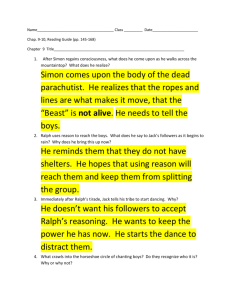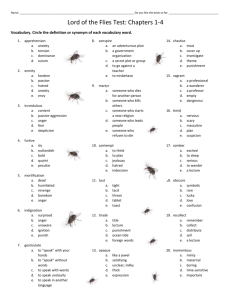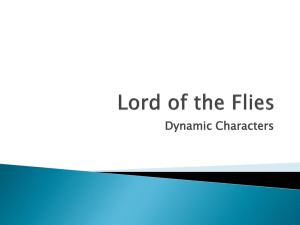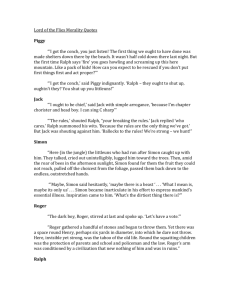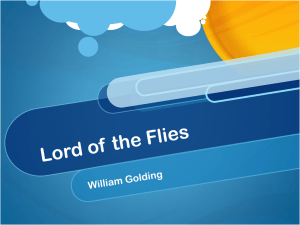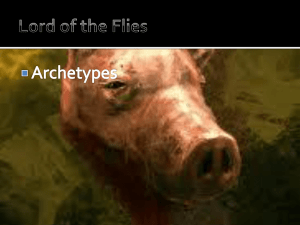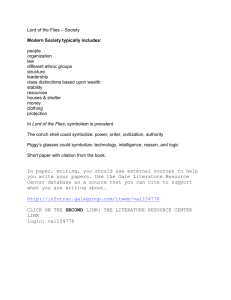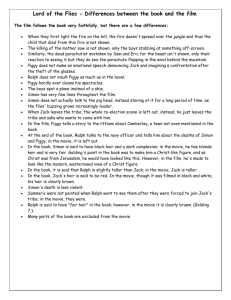Chapter 10
advertisement
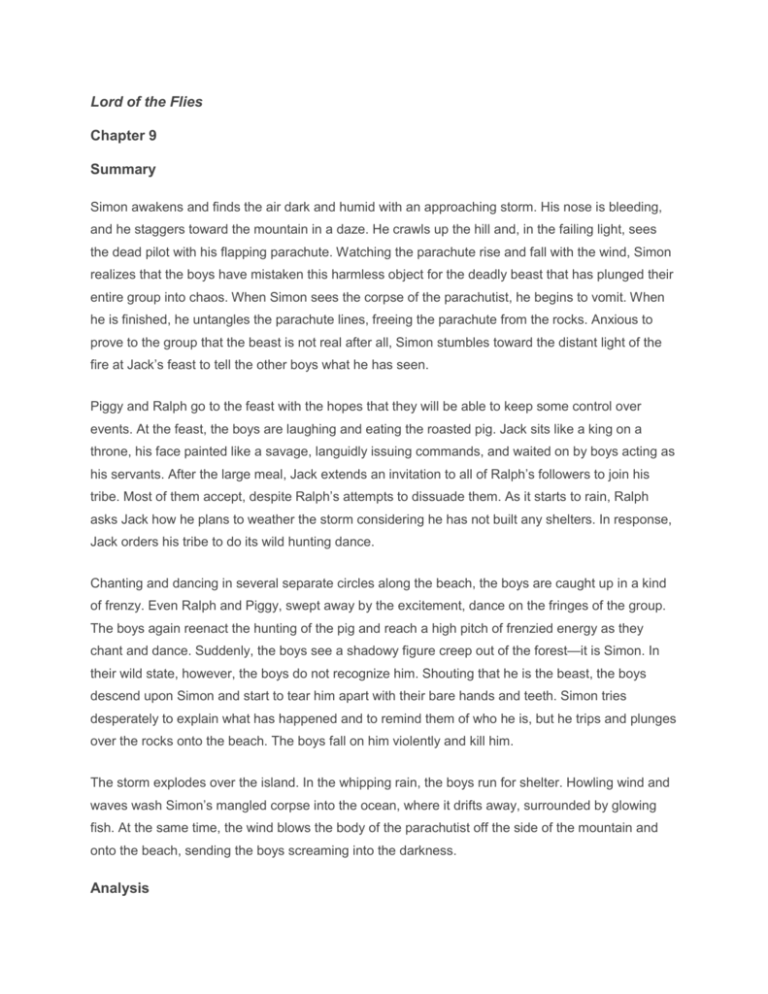
Lord of the Flies Chapter 9 Summary Simon awakens and finds the air dark and humid with an approaching storm. His nose is bleeding, and he staggers toward the mountain in a daze. He crawls up the hill and, in the failing light, sees the dead pilot with his flapping parachute. Watching the parachute rise and fall with the wind, Simon realizes that the boys have mistaken this harmless object for the deadly beast that has plunged their entire group into chaos. When Simon sees the corpse of the parachutist, he begins to vomit. When he is finished, he untangles the parachute lines, freeing the parachute from the rocks. Anxious to prove to the group that the beast is not real after all, Simon stumbles toward the distant light of the fire at Jack’s feast to tell the other boys what he has seen. Piggy and Ralph go to the feast with the hopes that they will be able to keep some control over events. At the feast, the boys are laughing and eating the roasted pig. Jack sits like a king on a throne, his face painted like a savage, languidly issuing commands, and waited on by boys acting as his servants. After the large meal, Jack extends an invitation to all of Ralph’s followers to join his tribe. Most of them accept, despite Ralph’s attempts to dissuade them. As it starts to rain, Ralph asks Jack how he plans to weather the storm considering he has not built any shelters. In response, Jack orders his tribe to do its wild hunting dance. Chanting and dancing in several separate circles along the beach, the boys are caught up in a kind of frenzy. Even Ralph and Piggy, swept away by the excitement, dance on the fringes of the group. The boys again reenact the hunting of the pig and reach a high pitch of frenzied energy as they chant and dance. Suddenly, the boys see a shadowy figure creep out of the forest—it is Simon. In their wild state, however, the boys do not recognize him. Shouting that he is the beast, the boys descend upon Simon and start to tear him apart with their bare hands and teeth. Simon tries desperately to explain what has happened and to remind them of who he is, but he trips and plunges over the rocks onto the beach. The boys fall on him violently and kill him. The storm explodes over the island. In the whipping rain, the boys run for shelter. Howling wind and waves wash Simon’s mangled corpse into the ocean, where it drifts away, surrounded by glowing fish. At the same time, the wind blows the body of the parachutist off the side of the mountain and onto the beach, sending the boys screaming into the darkness. Analysis With the brutal, animalistic murder of Simon, the last vestige of civilized order on the island is stripped away, and brutality and chaos take over. By this point, the boys in Jack’s camp are all but inhuman savages, and Ralph’s few remaining allies suffer dwindling spirits and consider joining Jack. Even Ralph and Piggy themselves get swept up in the ritual dance around Jack’s banquet fire. The storm that batters the island after Simon’s death pounds home the catastrophe of the murder and physically embodies the chaos and anarchy that have overtaken the island. Significantly, the storm also washes away the bodies of Simon and the parachutist, eradicating proof that the beast does not exist. Jack makes the beast into a godlike figure, a kind of totem he uses to rule and manipulate the members of his tribe. He attributes to the beast both immortality and the power to change form, making it an enemy to be feared and an idol to be worshiped. The importance of the figure of the beast in the novel cannot be overstated, for it gives Jack’s tribe a common enemy (the beast), a common system of belief (their conviction that the mythical beast exists), a reason to obey Jack (protection from the beast), and even a developing system of primitive symbolism and iconography (face paint and the Lord of the Flies). In a sense, Simon’s murder is an almost inevitable outcome of his encounter with the Lord of the Flies in Chapter 8. During the confrontation in the previous chapter, the Lord of the Flies foreshadows Simon’s death by promising to have some “fun” with him. Although Simon’s vision teaches him that the beast exists inside all human beings, his confrontation with the beast is not complete until he comes face-to-face with the beast that exists within the other boys. Indeed, when the boys kill Simon, they are acting on the savage instinct that the beast represents. Additionally, the manner of Simon’s death continues the parallels between Simon and Jesus: both die sacrificial deaths after learning profound truths about human morality. But Simon’s death differs from Jesus’ in ways that complicate the idea that Simon is simply a Christ figure. Although Jesus and Simon both die sacrificial deaths, Jesus was killed for his beliefs, whereas Simon is killed because of the other boys’ delusions. Jesus died after conveying his message to the world, whereas Simon dies before he is able to speak to the boys. In the biblical tradition, Jesus dies to alleviate the burden of mankind’s sin; Simon’s death, on the other hand, simply intensifies the burden of sin pressing down upon the island. According to the Bible, Jesus’ death shows others the way to salvation; Simon’s death exemplifies the power of evil within the human soul. Chapter 10 Summary The next morning, Ralph and Piggy meet on the beach. They are bruised and sore and feel awkward and deeply ashamed of their behavior the previous night. Piggy, who is unable to confront his role in Simon’s death, attributes the tragedy to mere accident. But Ralph, clutching the conch desperately and laughing hysterically, insists that they have been participants in a murder. Piggy whiningly denies the charge. The two are now virtually alone; everyone except Sam and Eric and a handful of littluns has joined Jack’s tribe, which is now headquartered at the Castle Rock, the mountain on the island. At the Castle Rock, Jack rules with absolute power. Boys are punished for no apparent reason. Jack ties up and beats a boy named Wilfred and then warns the boys against Ralph and his small group, saying that they are a danger to the tribe. The entire tribe, including Jack, seems to believe that Simon really was the beast, and that the beast is capable of assuming any disguise. Jack states that they must continue to guard against the beast, for it is never truly dead. He says that he and two other hunters, Maurice and Roger, should raid Ralph’s camp to obtain more fire and that they will hunt again tomorrow. The boys at Ralph’s camp drift off to sleep, depressed and losing interest in the signal fire. Ralph sleeps fitfully, plagued by nightmares. They are awakened by howling and shrieking and are suddenly attacked by a group of Jack’s hunters. The hunters badly beat Ralph and his companions, who do not even know why they were assaulted, for they gladly would have shared the fire with the other boys. But Piggy knows why, for the hunters have stolen his glasses, and with them, the power to make fire. Analysis In the period of relative calm following Simon’s murder, we see that the power dynamic on the island has shifted completely to Jack’s camp. The situation that has been slowly brewing now comes to a full boil: Jack’s power over the island is complete, and Ralph is left an outcast, subject to Jack’s whims. As civilization and order have eroded among the boys, so has Ralph’s power and influence, to the extent that none of the boys protests when Jack declares him an enemy of the tribe. As Jack’s power reaches its high point, the figures of the beast and the Lord of the Flies attain prominence. Similarly, as Ralph’s power reaches its low point, the influence and importance of other symbols in the novel—such as the conch shell and Piggy’s glasses—decline as well. As Ralph and Piggy discuss Simon’s murder the following morning, Ralph clutches the conch shell to him for solace, but the once-potent symbol of order and civilization is now useless. Here, Ralph clings to it as a vestige of civilization, but with its symbolic power fading, the conch shell is merely an object. Like the signal fire, it can no longer give Ralph comfort. Piggy’s glasses, the other major symbol of civilization, have fallen into Jack’s hands. Jack’s new control of the ability to make fire emphasizes his power over the island and the demise of the boys’ hopes of being rescued. We learn a great deal about the different boys’ characters through their varying reactions to Simon’s death. Piggy, who is used to being right because of his sharp intellect, finds it impossible to accept any guilt for what happened. Instead, he sets his mind to rationalizing his role in the affair. Ralph refuses to accept Piggy’s easy rationalization that Simon’s death was accidental and insists that the death was a murder. Yet the word murder, a term associated with the rational system of law and a civilized moral code, now seems strangely at odds with the collective madness of the killing. The foreignness of the word in the context of the savagery on the island reminds us how far the boys have traveled along the moral spectrum since the time when they were forced to follow the rules of adults. Jack, for his part, has become an expert in using the boys’ fear of the beast to enhance his own power. He claims that Simon really was the beast, implying that the boys have a better grasp of the truth in their frenzied bloodlust than in their calmer moments of reflection. This conclusion is not surprising coming from Jack, who seems almost addicted to that state of bloodlust and frenzy. Jack’s ability to convince the other boys that the state of bloodlust is a valid way of interacting with the world erodes their sense of morality even further and enables Jack to manipulate them even more. Chapter 11 Summary The next morning, Ralph and his few companions try to light the fire in the cold air, but the attempt is hopeless without Piggy’s glasses. Piggy, squinting and barely able to see, suggests that Ralph hold a meeting to discuss their options. Ralph blows the conch shell, and the boys who have not gone to join Jack’s tribe assemble on the beach. They decide that their only choice is to travel to the Castle Rock to make Jack and his followers see reason. Ralph decides to take the conch shell to the Castle Rock, hoping that it will remind Jack’s followers of his former authority. Once at Jack’s camp, however, Ralph’s group encounters armed guards. Ralph blows the conch shell, but the guards tell them to leave and throw stones at them, aiming to miss. Suddenly, Jack and a group of hunters emerge from the forest, dragging a dead pig. Jack and Ralph immediately face off. Jack commands Ralph to leave his camp, and Ralph demands that Jack return Piggy’s glasses. Jack attacks Ralph, and they fight. Ralph struggles to make Jack understand the importance of the signal fire to any hope the boys might have of ever being rescued, but Jack orders his hunters to capture Sam and Eric and tie them up. This sends Ralph into a fury, and he lunges at Jack. Ralph and Jack fight for a second time. Piggy cries out shrilly, struggling to make himself heard over the brawl. As Piggy tries to speak, hoping to remind the group of the importance of rules and rescue, Roger shoves a massive rock down the mountainside. Ralph, who hears the rock falling, dives and dodges it. But the boulder strikes Piggy, shatters the conch shell he is holding, and knocks him off the mountainside to his death on the rocks below. Jack throws his spear at Ralph, and the other boys quickly join in. Ralph escapes into the jungle, and Roger and Jack begin to torture Sam and Eric, forcing them to submit to Jack’s authority and join his tribe. Analysis In the chaos that ensues when Ralph’s and Jack’s camps come into direct conflict, two important symbols in the novel—the conch shell and the Lord of the Flies—are destroyed. Roger, the character least able to understand the civilizing impulse, crushes the conch shell as he looses the boulder and kills Piggy, the character least able to understand the savage impulse. As we see in the next chapter, Ralph, the boy most closely associated with civilization and order, destroys the Lord of the Flies, the governing totem of the dark impulses within each individual. With Piggy’s death and Sam and Eric’s forced conversion to Jack’s tribe, Ralph is left alone on the island, doomed to defeat by the forces of bloodlust and primal chaos. Appropriately, Ralph’s defeat comes in the form of the hunt, which has been closely associated with the savage instinct throughout Lord of the Flies. Ironically, although hunting is necessary to the survival of the group—there is little other food on the island aside from fruit, which has made many of the boys sick—it is also what drives them into deadly barbarism. From the beginning of the novel, the hunters have been the ones who have pioneered the way into the realm of savagery and violence. Furthermore, the conflict between Ralph and Jack has often manifested itself as the conflict between the interests of the hunters and the interests of the rest of the group. In Chapter 3, for instance, the boys argue over whether Jack’s followers should be allowed to hunt or forced to build huts with Ralph and Simon. Now that Jack and the forces of savagery have risen to unchallenged prominence on the island, the hunt has thoroughly won out over the more peaceful civilizing instinct. Rather than successfully mitigate the power of the hunt with the rules and structures of civilization, Ralph becomes a victim of the savage forces the hunt represents—he has literally become the prey. Chapter 12 Summary Ralph hides in the jungle and thinks miserably about the chaos that has overrun the island. He thinks about the deaths of Simon and Piggy and realizes that all vestiges of civilization have been stripped from the island. He stumbles across the sow’s head, the Lord of the Flies, now merely a gleaming white skull—as white as the conch shell, he notes. Angry and disgusted, Ralph knocks the skull to the ground and takes the stake it was impaled on to use as a weapon against Jack. That night, Ralph sneaks down to the camp at the Castle Rock and finds Sam and Eric guarding the entrance. The twins give him food but refuse to join him. They tell him that Jack plans to send the entire tribe after him the next day. Ralph hides in a thicket and falls asleep. In the morning, he hears Jack talking and torturing one of the twins to find out where Ralph is hiding. Several boys try to break into the thicket by rolling a boulder, but the thicket is too dense. A group of boys tries to fight their way into the thicket, but Ralph fends them off. Then Ralph smells smoke and realizes that Jack has set the jungle on fire in order to smoke him out. Ralph abandons his hiding place and fights his way past Jack and a group of his hunters. Chased by a group of body-painted warrior-boys wielding sharp wooden spears, Ralph plunges frantically through the undergrowth, looking for a place to hide. At last, he ends up on the beach, where he collapses in exhaustion, his pursuers close behind. Suddenly, Ralph looks up to see a naval officer standing over him. The officer tells the boy that his ship has come to the island after seeing the blazing fire in the jungle. Jack’s hunters reach the beach and stop in their tracks upon seeing the officer. The officer matter-of-factly assumes the boys are up to, as he puts it, “fun and games.” When he learns what has happened on the island, the officer is reproachful: how could this group of boys, he asks—and English boys at that—have lost all reverence for the rules of civilization in so short a time? For his part, Ralph is overwhelmed by the knowledge that he has been rescued, that he will escape the island after coming so close to a violent death. He begins to sob, as do the other boys. Moved and embarrassed, the naval officer turns his back so that the boys may regain their composure. Analysis After Ralph’s tense, exciting stand against the hunters, the ending of Lord of the Flies is rife with irony. Ralph had thought the signal fire—a symbol of civilization—was the only way to lure rescuers to the island. Ironically, although it is indeed a fire that lures a ship to the island, it is not an ordered, controlled signal fire but rather the haphazard forest fire Jack’s hunters set solely for the purpose of killing Ralph. As we have seen, Ralph has worked tirelessly to retain the structure of civilization and maximize the boys’ chances of being rescued. Now, when all he can do is struggle to stay alive as long as possible, a deus ex machina (an improbable or unexpected device or character that suddenly appears to resolve a situation) appears, at the last possible moment, in the form of the naval officer who brings the boys back to the world of law, order, and society. Golding’s use of irony in the last chapter blurs the boundary between civilization and savagery and implies that the two are more closely connected than the story has illustrated. Ultimately, the boys’ appalling savagery brings about the rescue that their coordinated and purposeful efforts were unable to achieve. Much of the irony at the end of the novel stems from Golding’s portrayal of the naval officer. Although the naval officer saves Ralph, the ending of Lord of the Flies still is not particularly happy, and the moment in which the officer encounters the boys is not one of untainted joy. The officer says that he is unable to understand how upstanding British lads could have acted with such poor form. Ironically, though, this “civilized” officer is himself part of an adult world in which violence and war go hand in hand with civilization and social order. He reacts to the savage children with disgust, yet this disgust is tinged with hypocrisy. Similarly, the children are so shocked by the officer’s presence, and are now psychologically so far removed from his world, that they do not instantly celebrate his arrival. Rather, they stand before him baffled and bewildered. Even Ralph, whose life has literally been saved by the presence of the ship, weeps tears of grief rather than joy. For Ralph, as for the other boys, nothing can ever be as it was before coming to the island of the Lord of the Flies.
